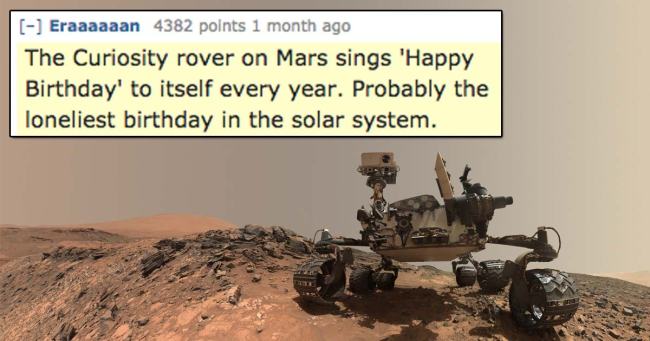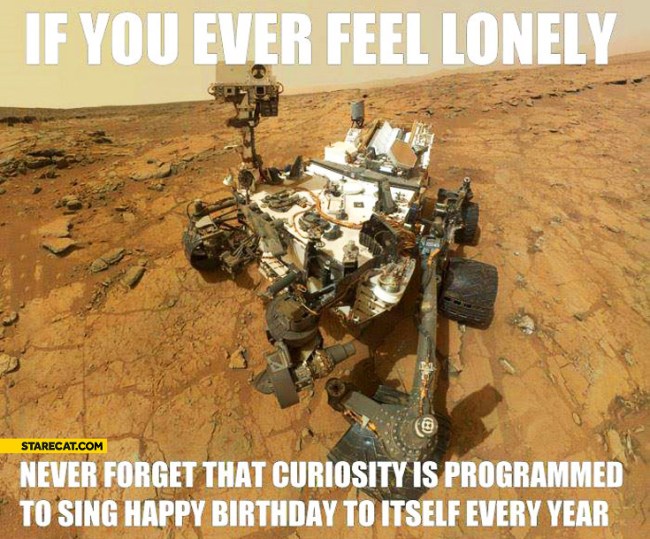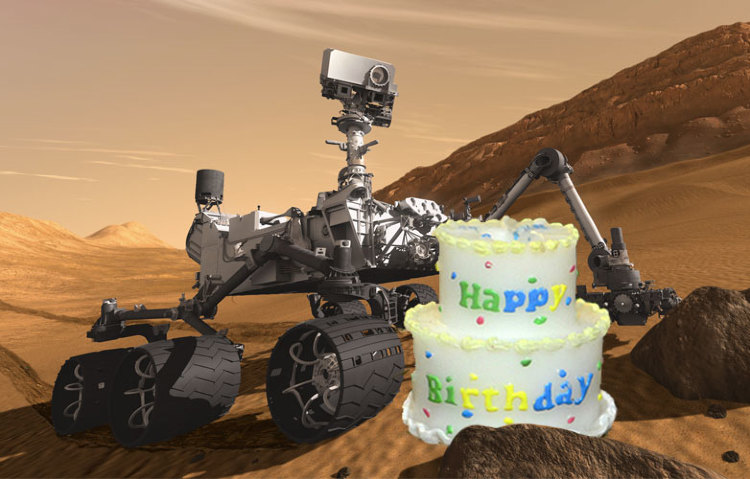Lies.
After the Curiosity Rover hummed itself “Happy Birthday” on Mars in 2013, the Internet lost its collective mind over the idea of the robot’s lonely celebration on the Red Planet. We assumed that this tradition continued every August 5th, but it turns out this is not the case. No, Curiosity has been left more solitary than ever, without even the solace of song.
The reports of my singing are greatly exaggerated. I only hummed “Happy Birthday” to myself once, back in 2013. 🎂🎵 https://t.co/wK3HGP2STY pic.twitter.com/o4b3AuVm1c
— Curiosity Rover (@MarsCuriosity) August 4, 2017
The Atlantic contacted Florence Tan, the deputy chief technologist at NASA’s Science Mission Directorate, to find out why on Earth (sorry) the team stopped letting Curiosity continue its sad and wonderful singing.
“The answer to your question will sound rather cold and unfeeling,” her email began.
Oh, no.
“In a nutshell, there is no scientific gain from the rover playing music or singing ‘Happy Birthday’ on Mars,” Tan said. In the battle between song and science, science always wins.
Tan acknowledged that this may be a difficult truth for some. “We earthlings,” as she put it, tend to anthropomorphize robots. Many studies have shown that people can have feelings of attachment and protectiveness toward robots as they would for humans. The more “alive” a robot appears, the more likely people are to react to it in ways usually reserved for living beings.
I really have no idea what Tan is getting at? Just because I’m picturing the Curiosity Rover in a paper party hat rolling around Mars while its dulcet robotic tones resound off of the dusty landscape but no one is there to listen or appreciate it or buy it a drink or get it even a single goddamned present and I’m crying now, so what?
Anthropomorphize? Me? Curiosity is my friend, thankyouverymuch. And friends care about each other’s birthdays.

More lies.
So I feel just awful that I forgot about Curiosity’s big day on August 5th. I’m sorry, pal. I’ll make it up to you, promise.
For Tan, Curiosity isn’t a cute robot, it’s a $2.5 billion national asset. Tan said she and other Curiosity team members are mindful of the purpose of the mission, which is to study Mars. The process of generating and transmitting commands to Curiosity takes weeks of preparation and involves reviews and walk-throughs with various groups. “It’s not just, ‘Oh, I’m ready to send a command, just send an email to somebody,’” Tan said in a phone interview. The rover’s activities are scheduled down to the minute, and SAM requires power to operate.
Everyone deserves to have their special day, Ms. Tan. Maybe you guys could invest some of those fancy science billions into a birthday party planner/engineer? Just a suggestion. You can have that one for free, NASA.
Curiosity runs on a nuclear battery that turns heat into electricity, and it will eventually die.
YOU BITE YOUR TONGUE, THE ATLANTIC. I DON’T WANT TO HEAR ANOTHER WORD OUT OF YOU.

STOP LYING.
Curiosity, don’t you listen to those mean scientists and journalists and all of these memes full of misinformation. They don’t know you like I know you. And I will sing you happy birthday every year exactly on August 5th from now on until the day when I get to blast off from this hellscape planet on a mission to colonize Mars and we can finally celebrate together.
(via The Atlantic, image: NASA, Tumblr)
Want more stories like this? Become a subscriber and support the site!
—The Mary Sue has a strict comment policy that forbids, but is not limited to, personal insults toward anyone, hate speech, and trolling.—










Published: Aug 11, 2017 04:31 pm